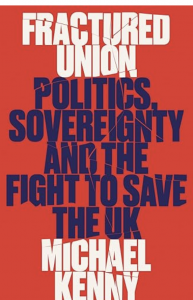Another book about which I can’t claim impartiality: my dear colleague Michael Kenny’s Fractured Union: Politics, Sovereignty and the Fight to Save the UK. As the title suggests, it concerns the territorial constitutional arrangements of the UK: progressive devolution of powers to Scotland, Wales and (in its distinctive context) Northern Ireland, tentative moves toward devolution within England, and the shocks imposed on the governance arrangements caused by Brexit and the pandemic. None of this within the context of a written constitutional or the clarity that might have provided.
I’ve had two bit parts in this process. One was as Vice Chair and Acting Chair of the BBC Trust during the Scottish referendum campaign in 2013-14. The Trust had been fighting the London-based BBC Executive tooth and nail since our formation as its governing body at the end of 2006 to introduce significant internal devolution of editorial decision making. We considered that the BBC needed to do much better serving the whole country than it was then able to do, being so firmly London-centric. The broader UK political tide away from centralisation was clear. The Executive hated the idea – I think for a mixture of financialrpractical reasons and deep resistance to ceding the idea of agenda-setting and commissioning to others.
Anyway, the referendum campaign froze this internal debate; the BBC had to be at pains to demonstrate its impartiality, which both sides of the campaign hated. I was hosting a box at the Last Night of the Proms in 2013 with then-Culture Secretary Sajid Javid as a guest. The Director-General was in the next box with then-Home Secretary Theresa May as his guest. My husband Rory, who has Welsh roots, was with me and so we bought a bundle of Welsh English flags outside the Albert Hall; it wouldn’t do to have the cameras catch the two central boxes as the only ones with no flag-wavers but we couldn’t choose either Union or Scottish flags. I looked across to our neighbours – and they had no flags at all. I was able to save Mrs May by offering her party some of ours.
My other experience was as the co-ordinator of the work that went into Greater Manchester’s pitch to George Osborne and the Treasury for the first city deal that led to the creation of the Combined Authority; this was the 2009 Manchester Independent Economic Review. It partly aimed to demonstrate competence to the sceptics in the Treasury, and partly to align leaders around the 10 component authorities around a nascent economic strategy for the new GMCA. One of the key lessons I drew from the experience was the importance of that classic political coalition-building, talking – a lot – to everybody who needed to be part of the journey. The city’s leadership impressed me then and has continued to do so. It hasn’t been uncontroversial, but this essay by Joshi Herrman in The Mill seems to me a fair assessment.
Anyway, Mike’s book is absolutely excellent. If anything, I think he perhaps understates a bit how much the rest of the country hates/hated Westminster/Whitehall, and the role this might have played in the Brexit vote (see Ch 7 here by me and Rob Ford). The conclusion I drew was that this story has much further to go.


I plan on reading The Rentier City by Isaac Rose. While I don’t know his arguments, I imagine it is a fairly typical critique of rentier/neoliberal capitalism which he believes Manchester has followed.